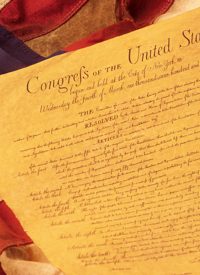
Ramesh Ponnuru is a senior editor at National Review. Ponnuru is an American of Indian descent, raised in the suburbs of Kansas City and educated at Princeton. He is a regular contributor to such national publications as the Washington Post, the New York Times, and Time magazine.
In the September 19, 2011 issue of National Review, Ponnuru offers an article entitled “What Constitutionalism Means.” In this thoughtful piece, Ponnuru contrasts the “liberal” reaction to Texas Governor Rick Perry’s brand of constitutionalism with his own interpretation of the proper regard for the timeless principles that undergird our founding charter.
To his credit, Ponnuru rightly ascribes much of the “Progressive” attitude toward the Constitution to an “impatience with the whole constitutional scheme of limited government,” as well as their favorite method of undermining our liberties, that is “to change the Constitution without going to the trouble of formally amending it.”
Signing statements, executive orders, federal judges who disregard the Constitution and legislate from the bench, regulations promulgated by the various executive branch agencies and then afforded the effect of law, and laws passed in violation of the enumerated powers granted to Congress all combine to make dizzying end runs around the Constitution. These tactics provide cover for the liberty-eroding strategy that is the modus operandi of every foe of freedom.
Ponnuru chronicles a few recent examples of this surreptitious strategy:
[R]ecall how liberals reacted to the difficulties they encountered in enacting Obamacare. The political system was said to be broken; complaints were leveled against the undemocratic Senate. If you doubt the second point, recall that after the ERA failed, liberals achieved almost everything they had wanted from it through the courts. There is nothing that liberal legal academics and activists refuse in principle to read into the Constitution because the ERA is absent from it.
The Supreme Court has amended the Constitution hundreds of times, in ways large and small, by reinterpreting its provisions, almost always to serve progressive ends.
How did we get to this perilous position? Are we somehow to blame for the severing of the fetters on federal power forged by our Founders? Have we unwittingly acquiesced to the unconstitutional growth of the federal government and the reduction of the states to mere appendages thereof? Ponnuru suggests that such is possible:
In each case, Americans had spent decades living under the relevant constitutional provisions without anyone’s imagining that they commanded what the Court now says they command. It is always possible, of course, that earlier Americans, by ratifying those provisions, committed themselves to principles that would have future applications they could not imagine.
Ponnuru suggests that “conservatives” do not behave likewise. That is to say, they do not seek ways to circumvent the Constitution in order to officially establish their version of right and wrong.
Unfortunately, the facts belie his assertion. In recent years, so-called “conservatives” have spent as much time chipping away at the walls erected around federal power as have their “liberal” counterparts.
George W. Bush, for example, suspended habeus corpus, initiated at least two illegal foreign wars, increased the size of the federal government, and perhaps most egregiously of all, he forcefully fought for the enactment of the Patriot Act, a package of measures that have done more to shred the Constitution than any “law” passed in recent memory.
Perhaps the discrepancy between Ponnuru’s notion of the “conservative” respect for the Constitution and the “liberal” disdain for it is to be found in the definition of constitutionalism that he presumes. Says Ponnuru:
Constitutionalism, in short, is simply a special case of respect for the rule of law: the case in which the law in question is the supreme law of the land. The rule of law demands that those who apply the law — be they judges, sheriffs, presidents, or governors — apply it faithfully. If those officials can change the meaning of the words, there is no point to having a written law.
This is mostly correct. The Constitution unquestionably nominates itself as the supreme law of the land. Article VI of the U.S. Constitution mandates that:
This Constitution, and the Laws of the United States which shall be made in pursuance thereof; and all treaties made, or which shall be made, under the authority of the United States, shall be the supreme law of the land; and the judges in every state shall be bound thereby, anything in the constitution or laws of any state to the contrary notwithstanding.
The phrase which Ponnuru, conservatives, and liberals all overlook is “in pursuance thereof.” Any bill proposed and passed by Congress that oversteps the boundaries set by the Constitution around its legislative power is null, void, and of no legal effect. The premise upon which the rule of law is based is that in the United States of America, there is no law outside of the Constitution. The Constitution is supreme insofar as its enumeration of limited powers are rigidly adhered to each and every time.
Admirably, Ponnuru is on the right track when he declares that "constitutionalism rules out certain courses of action. It means that it is never acceptable for a congressman to vote for unconstitutional, or even doubtfully constitutional, legislation on the theory that the courts will sort it out."
Next, Ponnuru addresses the reasons for which Americans should hold the Constitution sacrosanct and willingly hew to its provisions.
The fact that the Constitution is the law is not by itself sufficient reason to obey it. If it were radically unjust, we would have no such obligation; resistance to it, even on the part of officials exercising power under it, would in some cases be morally obligatory. Of course, and luckily, our Constitution is far better than that. But conservatives’ reverence for most of the content of our Constitution is the least important feature of constitutionalism, which is properly understood as the willingness to obey the Constitution, including those parts of it we do not revere.
It is easy to see from the foregoing that Ponnuru intends to demand that every amendment be revered equally and without analysis of the amendment according to the twin principles of republicanism and federalism upon which our general government is built.
For example, Ponnuru rightly reasons that some of the changes made to the Constitution are done “in order to restore its proper meaning.” Particularly, the National Review senior editor points to a few proposed amendments advocated by Rick Perry.
He [Perry] has spoken favorably about amendments to end the lifetime tenure of federal judges, to allow super-majorities of Congress to overturn Supreme Court decisions, to repeal the Sixteenth and Seventeenth Amendments (which established, respectively, the income tax and the direct election of senators), to limit federal spending, to define marriage in American law as the union of a man and a woman, and to prohibit abortion.
To lump all of these Perry-promoted alterations to our national charter is intellectually lazy and constitutionally unsound.
Informed constitutionalists will universally agree that repealing the 16th and 17th Amendments would be in furtherance of the original intent and structure of our Constitution. In that document, there is neither an enumeration of the power to impose an income tax nor to popularly elect Senators.
Likewise, however, there is nothing “originalist” in the alteration of the terms of office for federal judge or in the creation of “supermajorities” of Congress to nullify Supreme Court decisions. These two measures seem to excuse a flaccid congress and electorate. If we, the people, want to “overturn” Supreme Court decisions, we needn’t turn to Congress. There is already a sound principle of constitutionalism that provides a path toward that noble goal: nullification.
In a nutshell, nullification is the principle that each state retains the right to nullify, or invalidate, any statute passed by the national government that the state regards as unconstitutional. This powerful weapon against tyranny is in the arsenal of every state. As the sovereign states formed the union, and as creators of that compact, they hold the ultimate authority as to the limits of the power of the central government to enact laws that are to bind the states and the people. That is to say, may the creation be more powerful than the creator?
While Ponnuru wrote nearly 2,000 words ostensibly to define “constitutionalism,” his essay ends with praise of Perry, suggesting that the ultimate aim of the article is to subtly shill for Rick Perry’s nomination as the Republican candidate for President. A goal not so noble, especially when it’s on behalf of a candidate with a questionable record and a well-chronicled proclivity for behaving unconstitutionally.



